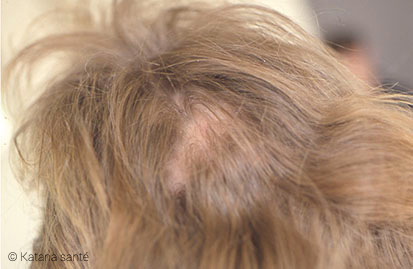Hair loss (in medical terms "alopecia"), usually spread over the entire scalp, sometimes accompanies the activity of lupus. It regresses without sequelae with the general treatment of the disease. But the regrowth is slow... On the other hand, when discoid lupus leads to localized patches of alopecia, the achievement of regrowth is uncertain. If hair loss occurs outside of a lupus flare, another cause should be looked for. This can be secondary to a drug (immunosuppressant), iron or vitamin deficiency, thyroid abnormality, excess testosterone (hyperandrogenism), a stressful situation or sometimes hairdressing habits (braided hair with traction alopecia).
Finally, an increase in hair loss is common in all women in the semester following childbirth. It is therefore not synonymous with lupus activity during this period.

Systemic lupus can be accompanied by diffuse hair loss that fades when the flare has completely subsided. If hair loss occurs outside of a lupus flare, then another cause should be looked for.